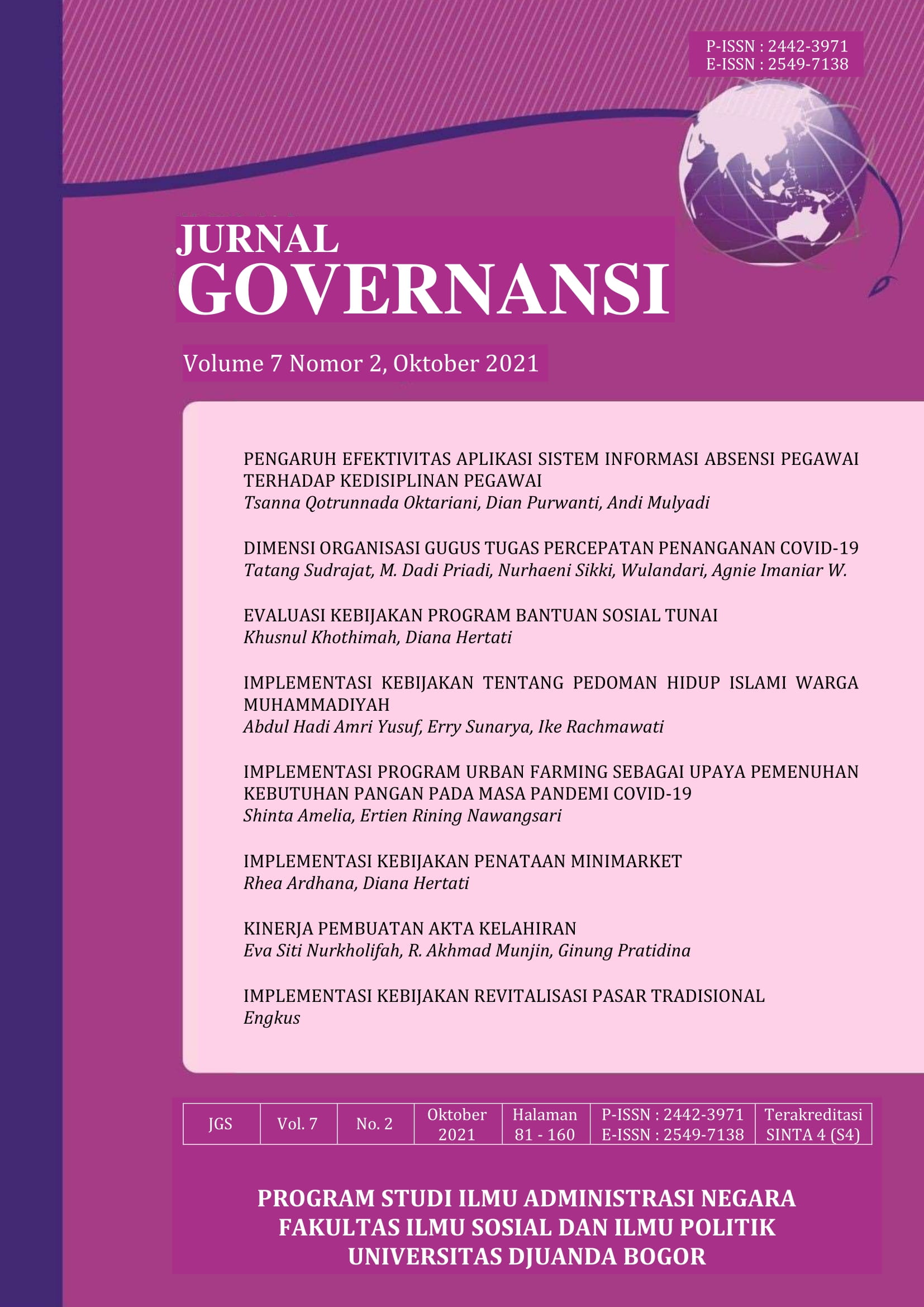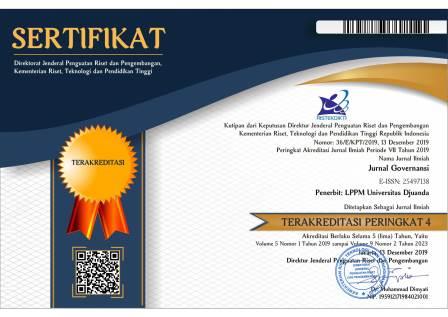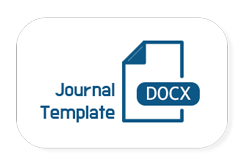Implementasi Kebijakan Penataan Minimarket di Kabupaten Sidoarjo
DOI:
https://doi.org/10.30997/jgs.v7i2.4233Keywords:
Kata kunci, Kebijakan Publik, Implementasi Kebijakan Publik, Penataan MinimarketAbstract
Pertumbuhan jumlah minimarket di Kabupaten Sidoarjo terus meningkat dari tahun ke tahun, hingga tahun 2019 tercatat ada 398 minimarket yang berdiri di Kabupaten Sidoarjo. Selain memberikan investasi yang tinggi kepada daerah, bertambahnya jumlah kegiatan perdagangan di sektor minimarket di Kabupaten Sidoarjo tentunya juga memberikan dampak yang buruk bagi masyarakat yang menjalankan UMKM dan Pasar Rakyat. Pemerintah Kabupaten Sidoarjo telah mengeluarkan sebuah kebijakan melalui Peraturan Daerah Kabupaten Sidoarjo No 10 Tahun 2019 yang mengatur tentang Penataan Toko Swalayan di Kabupaten Sidoarjo. Peraturan Daerah ini dibuat untuk meningkatkan pembinaan dan penataan usaha minimarket yang semakin banyak berkembang dan juga sebagai salah satu upaya perlindungan terhadap keberadaan pasar tradisional dan Usaha Mikro, Kecil dan Menengah. Penelitian ini bertujuan untuk mengetahui, mendeskripsikan, dan menganalisis implementasi Kebijakan Penataan Minimarket di Kabupaten Sidoarjo. Teori yang digunakan dalam penelitian ini yaitu dengan menggunakan model implementasi kebijakan Edward III. Metode penelitian yang digunakan kualitatif dengan pendekatan deskriptif bertujuan untuk mengungkapkan kejadian atau fakta, fenomena, variable, dan keadaan yang terjadi pada saat penelitian berlangsung dengan menyuguhkan apa yang sebenarnya terjadi. Hasil penelitian menunjukkan pelaksanaan Peraturan Daerah tersebut sudah terimplementasikan namun belum optimal. Masih banyaknya permasalahan dalam pelaksanaan Peraturan Daerah tersebut diantaranya masih adanya pelanggaran-pelanggaran yang terjadi dan tidak sesuai dengan Perda. Kurangnya sumber daya staf yang ada di Bidang Perdagangan Disperindag Kabupaten Sidoarjo sehingga kurang adanya pengaawasan terhadap pelanggaran yang terjadi, hal tersebut juga menjadi penghambat implementasi kebijakan ini.References
Buku
Ahmad, J. (2015). Metode Penelitian Admi-nistrasi Publik : Teori dan Aplikasi. Yogyakarta: Gava Media.
Anggara, S. D. M. S. (2014). Kebijakan Publik (1st ed.). Bandung: CV. Pustaka Setia.
Anggito, A., & Setiawan, J. (2018). Metodo-logi Penelitian Kualitatif. Sukabumi: CV Jejak.
Creswell, J. W. (2016). Research Design, Pendekatan Metode Kualitatif, Kuanti-tatif, dan Campuran. (4th ed.). Yogya-karta: Pustaka Pelajar.
Edwards III, George C. (1980). Implementing Public Policy. Washington, D.C.: Cong-ressional Quarterly Press.
Fatmi, N., Wigatiningrum, T. & Zaini, M. (2019). Kebijakan Pemerintah terha-dap Penataan Minimarket dan Pember-dayaan Pasar Tradisional (Studi Kasus di Kota Batu). Prosiding Simposium Nasional Tantangan Penyelenggaran Pemerintahan Di Era Revolusi Industri 4.0: 978-992.
Kadji, Y. (2015). Formulasi dan Implemen-tasi Kebijakan Publik, Kepemimpinan dan Perilaku Birokrasi dalam Fakta Realitas. Gorontalo: UNG Press.
Mulyadi, D. (2016). Studi Kebijakan Publik dan Pelayanan Publik: Konsep dan Aplikasi Proses Kebijakan Publik Berbasis Analisis Bukti untuk Pelayanan Publik. (2nd ed.). Bandung: Alfabeta.
Rohayati, Y. (2013). Implementasi Kebijakan Pemberian Izin Pendirian Minimarket Di Kota Bandung. Bandung: Universitas Padjajaran.
Suaib, M. R. (2016). Pengantar Kebijakan Publik: dari Administrasi Negara, Kebijakan Publik, Administrasi Publik, Pelayanan Publik, Good Governance, hingga Implementasi Kebijakan Publik. Yogyakarta: Calpulis.
Sugiyono. (2017). Metode Penelitian Kuanti-tatif, Kualitatif, dan R&D. Bandung: Alfabeta.
Tahir, A. (2011). Kebijakan Publik dan Transparansi Penyelenggaraan Peme-rintahan Daerah (H. Hadjarati (ed.); 1st ed.). Jakarta: PT. Pustaka Indonesia Press.
Winarno, B. (2007). Kebijakan Publik: Teori dan Proses. Yogyakarta: Media Press-indo.
Winarno, B. (2012). Kebijakan Publik: Teori, Proses, dan Studi Kasus. Edisi Revisi Terbaru. Yogyakarta: Center for Academic Publishing Service (CAPS).
Jurnal
Adzanny, R. M. F. & Marom, A. (2019). Implementasi Peraturan Walikota Nomor 39 Tahun 2014 tentang Pelak-sanaan Penataan Toko Swalayan di Kota Semarang (Studi Kasus Penataan Minimarket Kecamatan Tembalang). Journal of Public Policy and Manage-ment Review, 8(2): 222-238. https:// doi.org/10.14710/jppmr.v8i2.23613.
Lesmana, W., Rahmawati, R., & Seran, M. Y. (2017). Implementasi Peraturan Daerah Kabupaten Bogor Nomor 11 Tahun 2012 Dalam Penataan Mini-market. Jurnal Governansi, 3(1): 1-12. https://doi.org/10.30997/jgs.v3i1.808.
Mulyadi, M. (2013). Penelitian Kuantitatif dan Kualitatif serta Pemikiran Dasar Menggabungkannya. Jurnal Studi Komunikasi dan Media, 15(1): 127-137. https://doi.org/10.31445/jskm.2011.150106.
Puspitasari, D. N. & Subowo, A. (2016). Implementasi Peraturan Daerah Kota Semarang Nomor 1 Tahun 2014 tentang Penataan Toko Modern (Kajian Pendirian Minimarket di Kecamatan Banyumanik Kota Semarang). Journal of Public Policy and Management Review, 5(2): 280-193. http://ejournal-s1.undip.ac.id/index.php/jppmr/article/view/10974/10642.
Rusli, B. (2011). Kebijakan Penataan Mini-market dan Pemberdayaan Pedagang Tradisional di Kota Bandung: Studi di Kawasan Pemukiman Kecamatan Antapani. Sosiohumaniora, 13(2): 140-159. https://doi.org/10.24198/sosio humaniora.v13i2.5513.
Sari, E. N. L. (2017). Pengaruh Keberadaan Minimarket terhadap Kelangsungan Hidup Toko Kelontong di Kecamatan Sidoarjo Kabupaten Sidoarjo. Journal of Chemical Information and Modeling, 53(9): 1689-1699. file:///C:/Users/ User/Downloads/fvm939e.pdf.
Downloads
Published
How to Cite
Issue
Section
License
Copyright (c) 2021 JURNAL GOVERNANSI

This work is licensed under a Creative Commons Attribution-ShareAlike 4.0 International License.
Authors who publish with Jurnal Governansi agree to the following terms:
- Authors retain copyright and grant the journal right of first publication with the work simultaneously licensed under a Creative Commons Attribution 4.0 International License that allows others to share the work with an acknowledgement of the work's authorship and initial publication in Jurnal Governansi.
- Authors are able to enter into separate, additional contractual arrangements for the non-exclusive distribution of the journal's published version of the work (e.g., post it to an institutional repository or publish it in a book), with an acknowledgement of its initial publication in Jurnal Governansi.
- Authors are permitted and encouraged to post their work online (e.g., in institutional repositories or on their website) prior to and during the submission process, as it can lead to productive exchanges, as well as earlier and greater citation of published work.




















